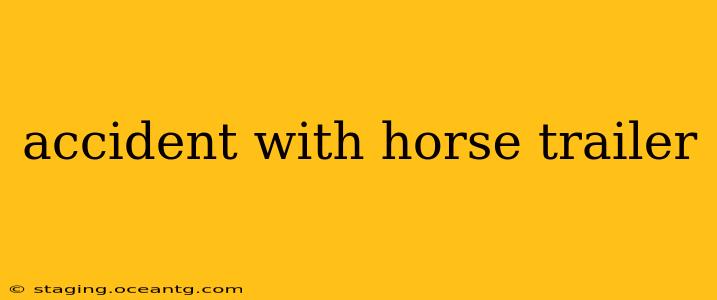Horse trailers, while essential for equine transport, present unique safety challenges. Accidents involving horse trailers can range from minor fender benders to serious collisions resulting in injury or fatality to both humans and animals. This comprehensive guide explores the causes of horse trailer accidents, safety measures to prevent them, and the legal ramifications following such incidents.
What are the Common Causes of Horse Trailer Accidents?
Several factors contribute to accidents involving horse trailers. These include:
-
Improper Loading and Securing of Horses: An improperly loaded trailer with horses shifting during transit can cause instability and sway, leading to accidents. Securely tying horses is crucial to prevent them from injuring themselves or causing the trailer to become unbalanced.
-
Mechanical Failure: Brake failure, tire blowouts, or hitch malfunctions are common mechanical issues that can lead to accidents. Regular maintenance and inspections are vital to prevent such failures.
-
Driver Error: Speeding, distracted driving, fatigue, and improper turning maneuvers are significant contributors to horse trailer accidents. Drivers must be alert, well-rested, and aware of the limitations of driving a vehicle towing a heavy trailer.
-
Adverse Weather Conditions: Rain, snow, or ice can significantly reduce traction, making it challenging to control a horse trailer, especially on inclines or curves. Driving cautiously in adverse weather is paramount.
-
Lack of Proper Lighting and Signaling: Inadequate lighting on the trailer can make it difficult for other drivers to see, increasing the risk of collisions, particularly at night or in low-visibility conditions.
What to Do After a Horse Trailer Accident?
Following a horse trailer accident, your immediate priorities should be safety and securing help.
-
Ensure Safety: Check for injuries to yourself, your passengers, and the horses. If anyone is injured, call emergency services immediately.
-
Contact Authorities: Report the accident to the police. Obtain a copy of the accident report, as it will be crucial for insurance claims and any potential legal proceedings.
-
Document the Scene: Take photographs of the accident scene, including damage to the vehicles and any injuries. If possible, collect witness contact information.
-
Seek Medical Attention: Even if injuries seem minor, seek medical attention to rule out any underlying issues.
-
Contact Your Insurance Company: Notify your insurance company as soon as possible about the accident.
What are the Legal Ramifications of a Horse Trailer Accident?
The legal consequences of a horse trailer accident can be complex and depend on the circumstances of the incident.
-
Liability: Determining liability often involves investigating who was at fault for the accident. This might involve examining driver error, mechanical failure, or other contributing factors.
-
Insurance Claims: Insurance companies will investigate the accident to determine coverage. Providing documentation such as police reports, medical records, and repair estimates is crucial for processing claims.
-
Personal Injury Claims: If injuries occur, individuals may file personal injury lawsuits to recover medical expenses, lost wages, and pain and suffering.
-
Property Damage Claims: Claims can also be filed to cover damages to the vehicles involved in the accident.
How Can I Prevent a Horse Trailer Accident?
Proactive safety measures significantly reduce the risk of accidents.
-
Regular Maintenance: Schedule regular inspections and maintenance of your horse trailer and towing vehicle, paying close attention to brakes, tires, lights, and hitch.
-
Proper Loading and Securing: Ensure horses are properly loaded and secured to prevent shifting during transit. Use appropriate tie-down methods and consider using dividers to prevent horses from colliding.
-
Defensive Driving: Drive defensively, allowing extra space for stopping and maneuvering, especially when towing a heavy load.
-
Driver Training: Consider taking a specialized course on towing and driving with a horse trailer.
-
Awareness of Surroundings: Always be aware of your surroundings and other vehicles on the road.
Are there specific regulations for horse trailers?
Regulations regarding horse trailers vary by location. Check with your local Department of Transportation or equivalent agency for specific rules regarding trailer size, weight limits, lighting requirements, and safety regulations.
This information is for general guidance only and does not constitute legal advice. Consult with legal professionals and insurance providers for specific advice related to your situation. Remember, prioritizing safety for both humans and animals is paramount when transporting horses.
